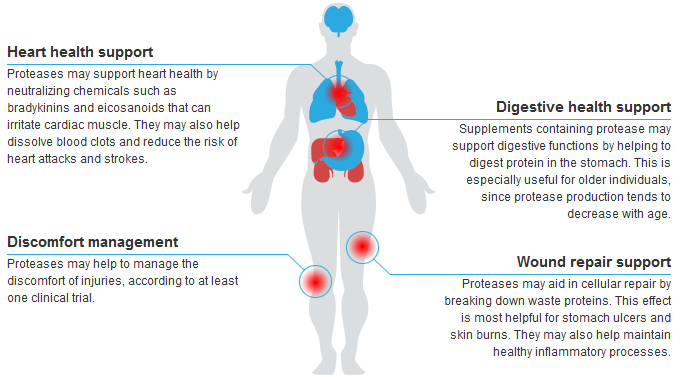 A protease is a general term for any enzyme that breaks down proteins. It may also be known by other terms such as a proteinase and peptidase, depending on the country. A protease splits the peptide bonds between the amino acids in a protein in a process known as hydrolysis. However, the specific mechanism may vary depending on the specific type of protease. For example, exopeptidases hydrolyze peptide bonds on the end of the protein chain, whereas endopeptidases hydrolyze peptide bonds inside the chain.
A protease is a general term for any enzyme that breaks down proteins. It may also be known by other terms such as a proteinase and peptidase, depending on the country. A protease splits the peptide bonds between the amino acids in a protein in a process known as hydrolysis. However, the specific mechanism may vary depending on the specific type of protease. For example, exopeptidases hydrolyze peptide bonds on the end of the protein chain, whereas endopeptidases hydrolyze peptide bonds inside the chain.
All life forms use proteases, making this class of enzymes especially large. The most well-known biological role of proteases is to digest proteins, although they also perform many other functions in the body. This action is relatively simple since it breaks proteins down into amino acids by simply hydrolyzing all of its peptide bonds.
However, other roles of proteases can be much more complex. Proteases are also involved in highly regulated processes that only hydrolyze specific peptide bonds. This requirement is common in protease functions such as dissolving blood clots, programmed cell death, and the prophenoloxidase-activating cascade that occurs in invertebrates.
Proteases are further classified according to the function they perform. For example, acid proteases such as pepsin are secreted by the stomach to digest food, while proteases in the blood such as plasmin and thrombin play important roles in regulating blood clotting.
Enzidase® AFP Concentrate is a food-grade acid protease that is produced by the fungus Aspergillus niger. It has a broad substrate specificity, meaning that it easily hydrolyzes most soluble proteins. The primary function of Enzidase® AFP Concentrate is to hydrolyze many proteins into smaller peptides, including animal protein, casein, gelatin, hemoglobin and soya. A specific protein’s susceptibility to hydrolysis is primarily dependent upon its physical structure. For example, globular proteins are generally the most resistant to hydrolysis due to their compact tertiary structure.
Protease activity is measured in units of Spectophotometric Acid Protease (SAPU), such that one SAPU will liberate one micromole of tyrosine per minute. The activity of Enzidase® AFP Concentrate is 4,000 SAPU per gram. This protease doesn’t require any cofactors or activators to achieve its full activity.
Enzidase® FP Concentrate is an enzyme complex that includes both endopeptidases and exopeptidases. This combination hydrolyzes proteins at all locations in the chain, allowing Enzidase® FP Concentrate to quickly break down a large range of proteins. Enzidase® FP Concentrate is most active in the upper intestine.
These enzymes are produced by a species of fungus known scientifically as Aspergillus oryzae. It has been used in East Asian cuisine for centuries, primarily for making fermented soybean products. A. oryzae is also used to make alcoholic beverages such as huangjiu, makgeolli and sake by converting starch into sugar.
A. oryzae grows rapidly on rice kernels and produces many enzymes during fermentation, especially amylases such as alpha-amylase and glucoamylase. It also produces some carboxypeptidase and a small amount of tyrosinase. The colored substances in A. oryzae fermentation products include flavins and deferriferrichrome.
The primary value of proteases in health supplements is their ability to aid in digestion. However, they can also support wound recovery, manage discomfort, and normal heart function.
Proteases may support heart health by neutralizing chemicals such as bradykinins and eicosanoids that can irritate cardiac muscle. They may also help dissolve blood clots and reduce the risk of heart attacks and strokes.
Proteases may help to manage the discomfort of injuries, according to at least one clinical trial.
Supplements containing protease may support digestive functions by helping to digest protein in the stomach. This is especially useful for older individuals, since protease production tends to decrease with age.
Proteases may aid in cellular repair by breaking down waste proteins. This effect is most helpful for stomach ulcers and skin burns. They may also help maintain healthy inflammatory processes.

The most significant sign that you may need protease is if you have a poor digestive system. The production of acid proteases tends to decrease with age, which can result in the inadequate digestion of protein. Oxidative stress may also cause age-related conditions that could benefit from proteases. You may need proteases if you have an elevated risk of cardiovascular problems such as heart attacks and strokes. Unhealthy inflammatory conditions such as arthritis and a compromised immune system may also mean that protease supplements could help you.

Digestive enzymes are proteins that are essential to the chemical breakdown of our food into smaller, more absorbable components. If we’re short on enzymes, some of the foods we eat aren’t broken down enough for the body to absorb the nutrients th...

Digestive Health Support Amylase Background and Benefits Amylase is an enzyme that helps to break down complex carbohydrates into simple sugars. Humans and some other mammals secrete amylase from the salivary glands and pancreas to begin the digestive process. Amylase causes starches such as pota...

Support for Healthy Inflammation Management Papain Background and Benefits Papain is an enzyme known scientifically as papaya proteinase I. It is found in the papaya and mountain papaya, which are tropical trees native to Central and South America. Papain is chemically related to other enzymes su...
Shipping calculated at checkout